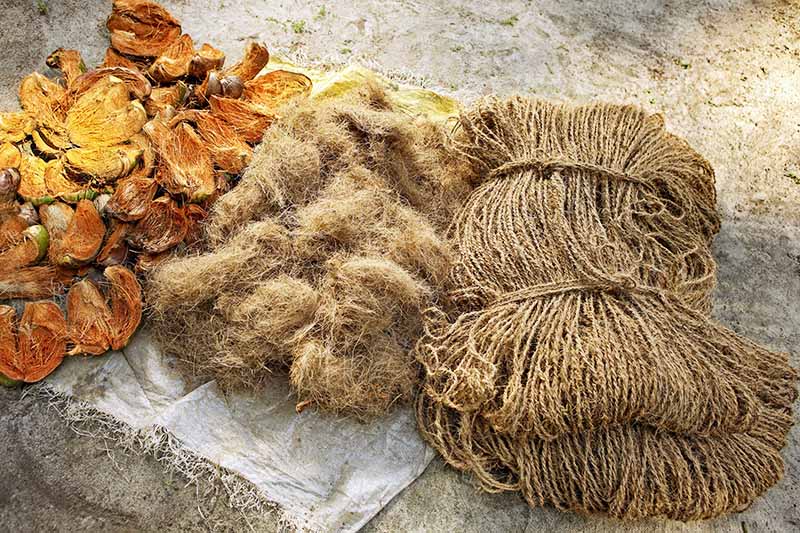
Soy Protein Fiber (SPF) is the only protein fiber made from soybean cake. Their physical properties are same as that of synthetic fiber. It gives tremendous change in properties like smoothness /lustre/ comfort/ absorbency/ strength/ shrinkage when mix with other fibres. Inspite of this, SPF is the only renewable botanic protein fiber. Its 16 amino acids are healthy and nutritional to people's skin.
6. Coconut fibre
 Coir or coconut fibre, is a natural fibre extracted from the husk of coconut and used in products such as floor mats, doormats, brushes and mattresses. Coir is the fibrous material found between the hard, internal shell and the outer coat of a coconut.
Coir or coconut fibre, is a natural fibre extracted from the husk of coconut and used in products such as floor mats, doormats, brushes and mattresses. Coir is the fibrous material found between the hard, internal shell and the outer coat of a coconut.
7. Wood
 The raw material for lyocell is cellulose from wood pulp. Lyocell is more accurately described as a recovered or regenerated fiber. Waste products in the air and water from the manufacturing process are minimal and considered harmless. Lyocell fiber is eco-friendly since products made from it can be recycled and lyocell is biodegradable because it is a cellulosic fibre.
The raw material for lyocell is cellulose from wood pulp. Lyocell is more accurately described as a recovered or regenerated fiber. Waste products in the air and water from the manufacturing process are minimal and considered harmless. Lyocell fiber is eco-friendly since products made from it can be recycled and lyocell is biodegradable because it is a cellulosic fibre.
8. Beech tree fibre
 Modal fabric is extremely hard-wearing and keeps its shape and finish, even after frequent washing. Unlike garments made from synthetic fibres like nylon and polyester, Modal fabrics does not trap perspiration and odours. Modal is up to 50 percent more absorbent than cotton, so clothes never feel sweaty and sticky.Modal is a type of rayon, a semi-synthetic cellulose fiber made by spinning reconstituted cellulose, often obtained from beech trees.
Modal fabric is extremely hard-wearing and keeps its shape and finish, even after frequent washing. Unlike garments made from synthetic fibres like nylon and polyester, Modal fabrics does not trap perspiration and odours. Modal is up to 50 percent more absorbent than cotton, so clothes never feel sweaty and sticky.Modal is a type of rayon, a semi-synthetic cellulose fiber made by spinning reconstituted cellulose, often obtained from beech trees.
9. rPet
RPET stands for recycled polyethylene terephthalate. PET is a strong, durable and recyclable material that is used for soda bottles, water bottles and food jars, while RPET can be made into such products as blankets, insulation, car parts, shoes and more.



